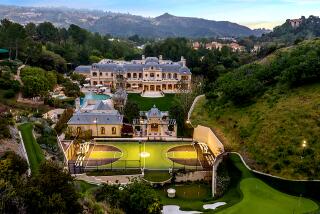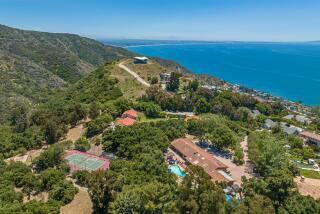Mark Hughes, Founder of Herbalife, Dies at 44
- Share via
Mark Reynolds Hughes, the wealthy 44-year-old founder of Herbalife International Inc., was found dead in his Malibu beachfront mansion Sunday morning, apparently of natural causes, a sheriff’s spokesman said.
Hughes, enmeshed recently in a struggle for ownership of his weight-loss and nutritional products company, was reported to have died at 11:02 a.m. at his $25-million Malibu estate at 33064 Pacific Coast Highway.
A Los Angeles County Sheriff’s Department homicide detective was dispatched to the home, but initial reports were that there was no sign of foul play.
“The exact cause of his death is going to be determined by a coroner’s autopsy later this week,” said Deputy Bruce Thomas. “They are not leaning toward foul play at all.”
Hughes’ relatives discovered his body, and they notified authorities, Thomas said.
Upset by the valuation given his company on the stock market, Hughes unsuccessfully tried to arrange financing to buy out shareholders. The $510-million buyout, announced last September, collapsed in April.
Over the years, Hughes was in and out of the public eye, as much for legal and regulatory problems that plagued his company as for his taste for expensive mansions in Beverly Hills and Malibu.
In the mid-1980s, Hughes, who was 24 when he started his company, was sued by the Food and Drug Administration, the California attorney general’s office, and the state Department of Health, over what they said were false health claims about Herbalife products and the various schemes used to market them.
Hughes in 1985 defended his controversial diet powders and pills during a hearing before a panel of U.S. senators. Attacking three nutrition and weight-control authorities who questioned the safety of his products, Hughes asked senators:
“If they’re such experts, then why are they fat? I’ve lost 16 pounds in the last few years.”
During the hearing, Hughes acknowledged that his own formal education stopped at the 9th grade. When asked during the hearing how he could be qualified to challenge leading medical experts, Hughes snapped: “I defy anybody to be able to produce results as this company has.”
Hughes reached settlements with the regulatory agencies in 1986. To settle his problems with the state, Hughes agreed to pay $850,000.
Hughes founded Herbalife in 1980, and the company hit $500 million in annual sales five years later. Revenues were generated both by outside sales and through the company’s network of 750,000 independent distributors, who bought Herbalife products in a multilevel pyramid, then resold them to individual consumers. In 1986, Hughes took the company public.
Last fall, dissatisfied with the price Herbalife shares were fetching on the stock market, Hughes announced he would by all the company’s outstanding shares, then selling for $12 or lower, for $17 a share. The offer was increased to $17.81 in January after shareholders sued.
After Hughes announced that he could not arrange the necessary financing, the company’s shares dropped to below $4. At the close of trading Friday, the shares were selling for just under $10.
Hughes also attracted attention with his lavish lifestyle and fondness for multimillion-dollar homes.
Last year, while he was seeking financing to buy his company’s outstanding shares, Hughes was battling homeowners in Benedict Canyon over his plans to build a 45,000-square-foot Mediterranean villa.
The Los Angeles City Council approved construction of the proposed $50-million home, which would have been bigger than the White House. Hughes, seeking a height limit exemption, found himself in a bitter fight with local homeowners, who said they feared the exemption would pave the way for other exemptions.
In December, Hughes was reported to have paid about $25 million for his Malibu home. It was said to be the highest price ever paid for a private home in Malibu.
Before that, Hughes lived in a Beverly Hills mansion known as Grayhall, which he purchased in 1992 in a real estate trade valued at $20 million. He bought two adjacent houses for $1 million each, and then had them bulldozed to expand his backyard.
More to Read
Sign up for Essential California
The most important California stories and recommendations in your inbox every morning.
You may occasionally receive promotional content from the Los Angeles Times.










